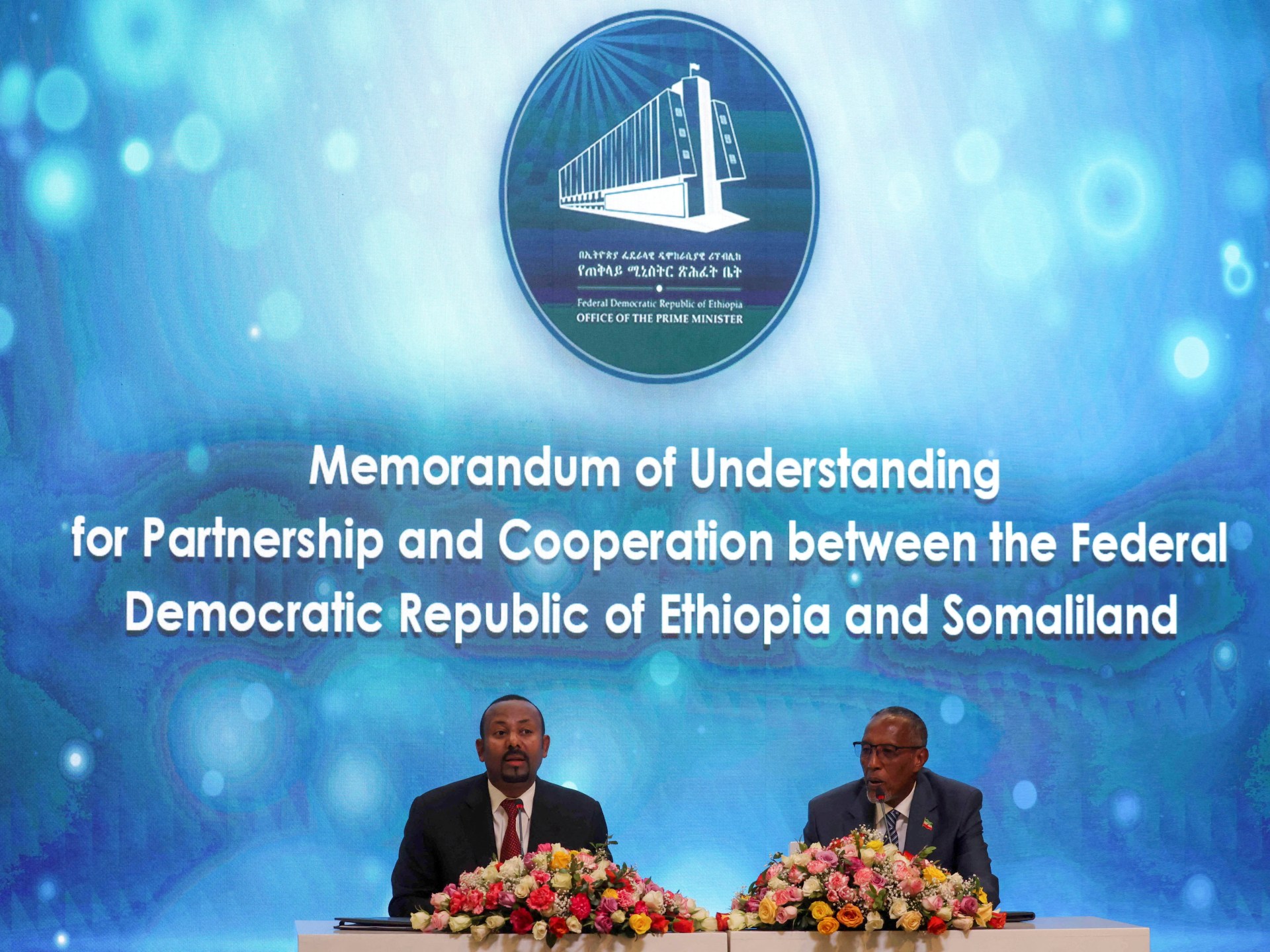Abdi (right) and Abiy Ahmed at the signing of the memorandum of understanding (Reuters)
Western newspapers have paid attention to the agreement under which Somaliland will be given access to the Red Sea to Ethiopia, an agreement that angered Somalia, which rejects the independence of this separatist region that is part of its territory, which means that geopolitical matters in the Horn of Africa are witnessing a combustible start to the new year.
The British magazine The Economist and the French magazine Lacroix and Le Point dealt with part of the issue that Ethiopia benefits from by obtaining a sea port that it has long sought and almost waged wars for, and under which Somaliland obtains recognition that brings it closer to emerging from isolation from which it has not found a way out for decades, but in return, it provokes the anger of Somalia, the apprehension of Djibouti, and fears mixed with relief in Eritrea.
Ethiopian Prime Minister Abiy Ahmed portrayed the agreement he signed with Somaliland President Muse Bihi Abdi as a diplomatic victory, fulfilling Ethiopia's decades-long quest for direct access to the sea, without resorting to force. We have no desire to coerce anyone by force."
An outlet on the sea in exchange for a confession
Abiy Ahmed has defended his country's right to access the Red Sea, using aggressive rhetoric on the issue, according to Lacroix, even going so far as to mention armed intervention, and his national security adviser Rizwan Hussein said that "Ethiopia will have access to a rented military base on the Red Sea as part of the deal."
For Somaliland's leaders, the agreement represents a breakthrough in its three-decade quest for international recognition, and the foreign ministry of the region, which is not recognized by the world as a country other than Ethiopia and Taiwan, stressed that the agreement "guarantees the access of Ethiopia and its naval forces to the Red Sea, in exchange for official recognition of the Republic of Somaliland, which constitutes an important diplomatic step for our country."
Somaliland could also acquire shares in Ethiopian Airlines, Africa's largest airline.
Somaliland unilaterally declared independence from Somalia in 1991, after the country plunged into chaos from which it had not yet fully emerged.
Although it has its own institutions and monetary issuances, Hergeisa has not received recognition of its independence by the international community.
Somaliland hopes that the rest of Africa will follow Ethiopia's example in recognizing it, because the African Union headquarters is located in Addis Ababa, and because Abiy Ahmed on the other hand enjoys strong ties with the powerful Gulf states, especially the UAE, which some foreign diplomats suspect may have played a role in brokering this deal due to its proximity to the Somaliland government.
According to The Economist, Abiy Ahmed announced the agreement at a time when he also hosted Sudan's most famous warlord, Mohamed Hamdan Dagalo (known as Hemedti), who is close to the UAE.
Diplomats see the establishment of an Ethiopian military base in Somaliland as the latest step in a plan to secure the UAE's sphere of influence across the wider Gulf region and the Horn of Africa.
Igniting tensions in the region
However, this sudden agreement, according to Le Point, risks reigniting tensions in the Horn of Africa, as the Somali government, which has never recognized Somaliland's independence, responded in a statement by saying that "the Somaliland region is part of Somalia under the constitution, so Somalia considers this action a flagrant violation of its sovereignty and unity."
Somalia called on the United Nations, the African Union, the Arab League and the East Africa Regional Organization IGAD to stand by Somalia to defend its sovereignty and force Ethiopia to abide by international laws.
Even the al-Qaeda-linked Islamist group al-Shabab, which has led a bloody insurgency against Somalia's federal government since 2007, has criticized the deal and Abiy Ahmed's "expansionist agenda," according to Lubuan.
The Somali president's special representative for Somaliland, Abdikarim Hussein Guled, on Monday criticized the Ethiopian government's actions, calling it "a blatant disregard for international norms and legal frameworks, and a flagrant violation of Somali territorial sovereignty" and warning that the agreement was "a unilateral act that endangers regional stability".
Western diplomat: The world is living in an age where if one is cruel and reckless, no one stands in his way
According to Lacroix, this agreement could weaken the stability of the entire region, especially by disrupting potential talks between Somalia and Somaliland, especially since the Somali authorities and the separatist Somaliland region announced talks last week mediated by Djiboutian President Ismail Omar Guelleh, the first of its kind since the failure of the last talks in 2020.
View from Berbera Harbour (island)
The agreement is likely to upset Egypt and Saudi Arabia, which do not view the UAE's quest for regional hegemony, and Djibouti, which will lose Ethiopian trade flows, will not be happy with it, but Eritrea will breathe a sigh of relief after Abiy appears to have achieved his goals without resorting to arms, but the prospect of an Ethiopian navy on its doorstep, however remote, will not be welcome.
The Economist warned that Ethiopia's gambit threatened to destabilize the already volatile Horn of Africa, but chose to conclude its report with a comment by a Western diplomat that "the world is living in an age where if one is cruel and reckless, no one stands in its way," a lesson that the magazine said Abiy Ahmed has long internalized.
Source: The Economist + Lacroix + Le Point

